|
|
|
Sort Order |
|
|
|
Items / Page
|
|
|
|
|
|
|
| Srl | Item |
| 1 |
ID:
062165
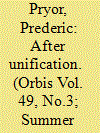

|
|
|
| 2 |
ID:
011883
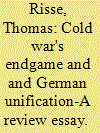

|
|
|
|
|
| Publication |
Spring 1997.
|
| Description |
159-185
|
|
|
|
|
|
|
|
|
|
|
|
|
|
|
|
| 3 |
ID:
002645


|
|
|
|
|
| Publication |
New Delhi, Radiant Press, 1993.
|
| Description |
xxii, 209p.
|
| Standard Number |
8170271888
|
|
|
|
|
|
|
|
|
|
|
|
Copies: C:1/I:0,R:0,Q:0
Circulation
| Accession# | Call# | Current Location | Status | Policy | Location |
| 033831 | 341.2422/LAL 033831 | Main | On Shelf | General | |
|
|
|
|
| 4 |
ID:
013752
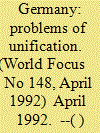

|
|
|
| 5 |
ID:
053925
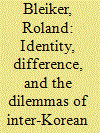

|
|
|
| 6 |
ID:
002643
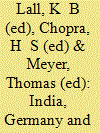

|
|
|
|
|
| Publication |
New Delhi, Radiant Publishers, 1993.
|
| Description |
xxii,164p.
|
| Standard Number |
8170271918
|
|
|
|
|
|
|
|
|
|
|
|
Copies: C:1/I:0,R:0,Q:0
Circulation
| Accession# | Call# | Current Location | Status | Policy | Location |
| 033833 | 341.2422/LAL 033833 | Main | On Shelf | General | |
|
|
|
|
| 7 |
ID:
120036
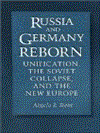

|
|
|
|
|
| Publication |
Princeton, Princeton University Press, 1999.
|
| Description |
xviii,300p.hbk
|
| Standard Number |
0691059659
|
|
|
|
|
|
|
|
|
|
|
|
Copies: C:1/I:0,R:0,Q:0
Circulation
| Accession# | Call# | Current Location | Status | Policy | Location |
| 057203 | 327.47043/STE 057203 | Main | On Shelf | General | |
|
|
|
|
| 8 |
ID:
132396
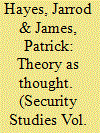

|
|
|
|
|
| Publication |
2014.
|
| Summary/Abstract |
Inspired by Rudra Sil and Peter Katzenstein's call for analytic eclecticism and making use of newly available, previously classified archival documents, we distill the essential logics of realism, neoliberal institutionalism, and constructivism and examine their role in shaping the debates amongst British policymakers in the context of German unification in 1989-90. We find that, although all the theoretical logics help shape the policymaking surrounding unification, none stands alone as a basis for understanding social reality. Indeed, all functioned together as British policymakers thought in terms of theory to make sense of German unification. The logic of realism clearly played an important role in shaping the perceptions of top British leadership, particularly Margaret Thatcher, of German unification as a problem. But realism did not determine the solution to the "problem." Instead, British policymakers drew on the logic embedded in neoliberal institutionalism, turning to institutions to manage the unification process. The reason for this can be found in the role of constructivist logics-particularly identity and rhetorical entrapment-that constrained British policymakers to cooperative policy options. By taking this approach, this article makes several important contributions. First, it sheds light on British policy during a critical historical moment. Second, it significantly improves understanding regarding Germany's historical and current place in Europe. Third, it ties major theoretical traditions together through a foreign policy analytical approach, and in the process suggests that many of the theoretical boundaries separating scholars are overdrawn. Finally, the article pushes international relations scholars to keep in mind the complex relationship between reality and theory. In the final analysis, bringing to bear these three perspectives highlights the complexity of the processes that produced British policy-and by extension those that shaped German unification-as well as the importance of breaking free of the strictures of the ideas versus materiality debate.
|
|
|
|
|
|
|
|
|
|
|
|
|
|
|
|
| 9 |
ID:
015123
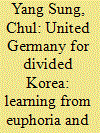

|
|
|
|
|
| Publication |
Fall 1992.
|
| Description |
436-462
|
|
|
|
|
|
|
|
|
|
|
|
|
|
|
|
|
|
|
|
|